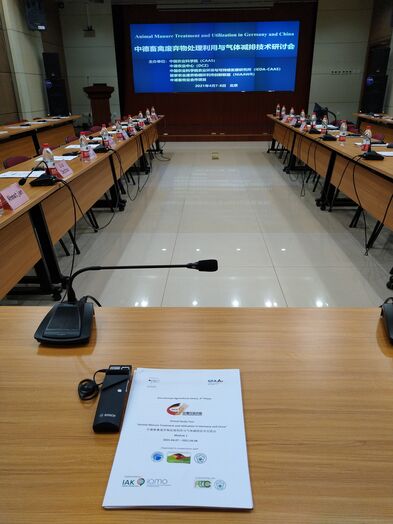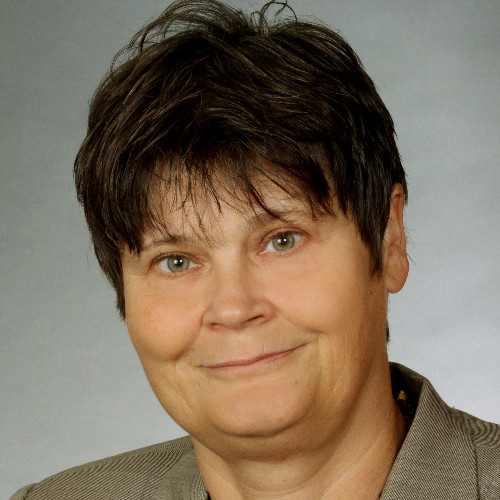On 7 and 8 April the DCZ, in cooperation with the Institute for Environment and Sustainable Development in Agriculture (IEDA) of CAAS and the Sino-German Animal Breeding and Husbandry Project successfully organized the first module of the virtual study tour on “Animal Manure Treatment and Utilization”.
Originally planned as a real study tour for Chinese researchers to Germany, due to COVID 19-related travel restrictions the activity had been redesigned as a hybrid workshop series with on site and online participation. The module 1 with the topic “Environmental and Administrative Aspects” was attended by 40 participants on site and 100 participants online from all over China and Germany. Opening remarks were delivered by Dr. Chen Tianjin (CAAS, Department for International Cooperation, Bilateral projects), Dr. Jürgen Ritter, managing director of DCZ, Liu Chousheng (National Animal Husbandry Station) and Ferdinand Schmitt (managing director of the Sino-German Animal Breeding and Husbandry Project). In her keynote Prof. Dong Hongmin, deputy director of IEDA outlined the importance of mitigating emissions from animal husbandry for climate change protection and China’s target to achieve GHG emission neutrality by 2060. She also introduced related research projects of her institute.
The first panel focused on administrative aspects of soil and water protection. Dr. Svenja Fuhrmann from the Federal Ministry for Food and Agriculture, Department for International Projects, introduced relevant European and German regulations including the EU nitrate guideline and the German fertilizer act. Dr. Frank Augsten from the Thuringian office for Agriculture and Rural Areas provided the perspective from a German federal State. Dr. Christine von Buttlar from the consulting IGLU talked about water protection and organic fertilizers. She stressed the importance of soil types for the risk of nitrate leaching and introduced impacts of manure storage solutions as well as low-emission application technologies and conservation (strip-till) tillage and intercropping on nitrogen levels in various soil depths.
 The second panel on “greenhouse gases from stable systems” was opened by a presentation from Professor Barbara Amon (Leibniz-Institute for Agricultural Engineering and Bioeconomy) who provided an overview of the impacts of nitrogen on air, soil and water quality and biodiversity. She further introduced to current emissions and targets in Germany. In the final section of her presentation, she explained some current and upcoming research projects of her research group such as current research on modelling and measuring air flow in naturally ventilated barns and the impact of livestock feeding on N-surplus. Some of these projects are implemented in cooperation with Prof. Dong Hongmin’s research group. Prof. Liu Dezhao, from the college of Biosystems Engineering and Food Science of Zhejiang University, gave a presentation on odorants removal technologies for intensive livestock production and how biofilters can avoid odor from organic manure. The last presentation of the first day was given by Prof. Jörg Oldenburg (Ingenieurbüro Oldenburg) who introduced adaptation strategies and technologies for lower emission and exhaust air cleaning systems in pig husbandry.
The second panel on “greenhouse gases from stable systems” was opened by a presentation from Professor Barbara Amon (Leibniz-Institute for Agricultural Engineering and Bioeconomy) who provided an overview of the impacts of nitrogen on air, soil and water quality and biodiversity. She further introduced to current emissions and targets in Germany. In the final section of her presentation, she explained some current and upcoming research projects of her research group such as current research on modelling and measuring air flow in naturally ventilated barns and the impact of livestock feeding on N-surplus. Some of these projects are implemented in cooperation with Prof. Dong Hongmin’s research group. Prof. Liu Dezhao, from the college of Biosystems Engineering and Food Science of Zhejiang University, gave a presentation on odorants removal technologies for intensive livestock production and how biofilters can avoid odor from organic manure. The last presentation of the first day was given by Prof. Jörg Oldenburg (Ingenieurbüro Oldenburg) who introduced adaptation strategies and technologies for lower emission and exhaust air cleaning systems in pig husbandry.
The topic “greenhouse gases – adaptation and mitigation strategies” was covered in the first panel of day 2. Prof. Walter Stinner from the German Biomass Research Institute elaborated on mitigation by CH4, NH3 and N2O emissions by anaerobic digestion and closed digestate storage. Helmut Döhler from Döhler Agrar Gmbh showed how ammonia emissions in swine stable systems can be mitigated by innovative stable technologies and management such as a reduction of emitting surfaces, frequent removal of slurry, reduction of dietary protein, and reduction of air temperature by “cooling fins and pipes”, acidification to reduce the pH-value of slurry and to reach a 60 – 80 % reduction of emissions, biofilters for smaller farms and biotrickling filters for larger farms. The keynotes were followed by three company presentations: Big Dutchman introduced the PigT, a system for separation of faeces and urine to avoid ammonia emissions in pig farms; the company Bauer/FAN explained the advantages of Bedding Recovery Unit (BRU) in cattle husbandry and the company Sano explained the advantages of SmartDairyNutrition for lower emissions.
The final panel focused on “fertilization with organic fertilizers”. Holger Beßler from Humboldt-University Berlin introduced recent research on the assessment of humus and nutrient effects of organic fertilizers and the establishment of organic matter as a carbon sink. Prof. Jürgen Augustin from the Leibniz Center for Agricultural Landscape Research presented research results on the impacts of deep tillage and fermentation residue on carbon and nitrogen dynamics of eroded soils. Peter Müller from AgUmenda consulting showed different technologies for the application of organic fertilizer. The last three presentations of that day were given by companies. KleuTec a start-up in agricultural technology showed an innovative system to avoid soil compaction by heavy machines for slurry application through a piping system. The companies Fliegl and Bauer demonstrated technologies for slurry transport and distribution.
The next workshop module will deal with the topic of “New Research and innovative technologies in manure and digestate treatment” and is scheduled for mid of June 2021 (dtbc).
Compiled German regulations on animal manure utilisation in Chinese: download here.




